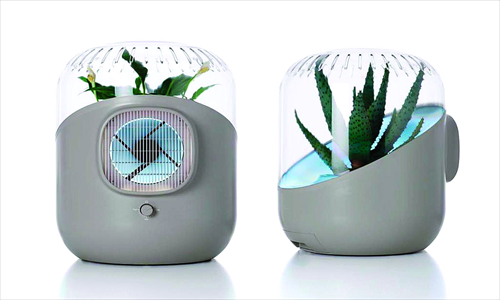Air purifier brands criticized for inaccurate specs

Photo: IC
The heavy smog that has descended on large part of China recently has boosted sales of air purifiers, but manufacturers and experts on Tuesday called for a compulsory national standard to regulate the rapidly growing market.
Several air purifier manufacturers including Philips, Panasonic, Sharp and Gree inaccurately described the capabilities of their products, such as failing to specify or exaggerating the maximum interior area that their products can purify, Shanghai Municipal Bureau of Quality and Technical Supervision (SMBQTS) said in a statement published on Saturday.
Because there is currently no compulsory national standard on coverage areas for air purifiers, some companies have taken advantages of this loophole and failed to accurately inform consumers about the functions and capabilities of their products, the bureau said.
"After receiving the notice from SMBQTS on November 18, we submitted a detailed description of our product to the bureau on November 25 and are still waiting for the bureau's response," a Shanghai-based customer service manager at Philips, who did not give her name, told the Global Times on Tuesday.
One of the company's products was found to have exaggerated its maximum purifying area in the specifications.
Currently there is no unified national compulsory standard, she said, noting that the company hopes that the Shanghai authorities can clarify the standard so that they can roll out necessary measures.
Panasonic is also on the list because it failed to specify maximum purifying areas for its products.
"All of our products manufactured in China do not specify maximum purifying areas, because we think the index is not representative enough," a staff member in the after-sales service department of Panasonic's air purifier plant in Guangzhou told the Global Times on Tuesday.
The air pollution that hit many parts of China in the previous week has boosted sales of air purifiers and masks.
"Our sales of air purifiers have been boosted due to the recent smoggy weather, and sales revenue of air purifiers in China have risen by 50 percent annually in the past few years," Ling Zhen, marketing director of Homes and Indoor Environment Control Business Line (Asia-Pacific) at Honeywell, told the Global Times on Tuesday.
"Solving air pollution is a tough and long-term task for the Chinese government," Lin said. "We have noticed the huge market potential in China's air purifier market, and the company will continue to develop innovative products targeting the market."
Experts said the fast-growing market lacks regulation and call for a compulsory standard.
"Currently the entry barrier for the air purifier industry is low due to the lack of a compulsory national standard, which also makes consumers confused when they choose from various products ranging from several hundred yuan to nearly 50,000 yuan ($8,235)," said Su Liang, an analyst with Beijing-based All View Consulting.
"The sales volume of air purifiers is still small compared with other home appliances, but as the industry grows bigger, regulations should be strengthened to protect consumers' interest," he noted.
Currently, foreign brands possess more than 80 percent of the market by virtue of their technological advantages in China's air purifier market, while domestic brands have less than 20 percent, Research and Markets said in a report released in November.
The low market shares of domestic brands are closely related to the short-term development of China's air purifier industry. Currently, Philips, Ya Du, Panasonic and Sharp are the leading four brands in China's market, the report said. Of the four, only Ya Du is a domestic brand.
Some latecomers have also made inroads in penetrating the fast-growing market. On tmall.com, the delivery date for Swedish maker Blueair's air purifiers, ranging from 4,260 yuan to 7,418 yuan, has been postponed to January 9 next year, after media reports said that the US embassy in China had ordered Blueair's products.
Sales of dust masks on Alibaba Group's two e-commerce platforms taobao.com and tmall.com surged by 903 percent year-on-year in the past seven days, and on another big online retailer jd.com, sales of air purifiers rose by 685.05 percent in the past five days from a year earlier, according to data provided by China e-Business Research Center on Tuesday.